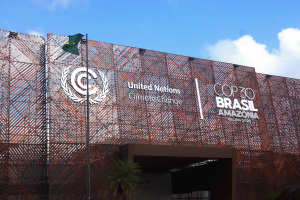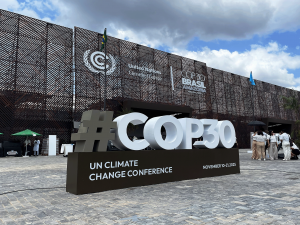COP30: Cities, states and regions ready to move beyond recognition to collaborative implementation
Local and other subnational governments will build on Belém’s outcomes to put multilevel action and urbanization in service of global climate implementation
We look forward to working to implement COP30's outcomes by elevating multilevel action and urbanization in climate implementation, in particular welcoming IPCC Special Report on Cities in 2027.”
BELéM, PARá, BRAZIL, November 24, 2025 /EINPresswire.com/ -- Upon the conclusion of COP30, the Local Governments and Municipal Authorities (LGMA) Constituency commends the Parties and COP30 Presidency on finding consensus after difficult and prolonged negotiations. Throughout this COP, the Constituency saw genuine recognition for the importance of local action, multilevel cooperation and urbanization through the Ministerials, progress on the Action Agenda and many Parties calling for a mandated dialogue on multilevel governance and urbanization.— Yunus Arikan, ICLEI Director, Global Advocacy, LGMA Focal Point
Thousands of local and regional leaders came to Brazil for the Local Leaders Forum in Rio and COP30 in Belém to respond to the call for an implementation COP. Many cities, states and regions are already transitioning away from fossil fuels, delivering adaptation support to communities, and confronting the realities of climate impacts each and every day.
The goal to make this the COP of implementation was right, but the final outcomes failed to deliver a mandated framework that includes local and other subnational governments. COP30 missed the opportunity to put implementers in the heart of the Belém Package and risks slowing the pace of national transitions at precisely the moment when acceleration is needed.
The Mutirão Decision that “welcomes the efforts of all non-Party stakeholders in addressing and responding to climate change, including … cities and other subnational authorities in multilevel climate action,” will be the basis for the Constituency’s continued commitment to supporting the implementation phase beyond Belém.
A new report launched at COP showing that the inclusion of local and other subnational governments in NDCs has nearly doubled in the NDCs submitted so far shows the trend outside of negotiations is on the right track.
“We look forward to working with COP30 Presidency and all nations and partners to implement the outcomes of COP30 by elevating multilevel action and urbanization in climate implementation, in particular towards welcoming the outcomes of IPCC Special Report on Cities in 2027,” said Yunus Arikan, Director of Global Advocacy at ICLEI - Local Governments for Sustainability (ICLEI) and the LGMA Focal Point to the UNFCCC.
LGMA RESPONSE TO THE NEGOTIATED OUTCOMES OF COP30
The Mutirão Decision recognizes subnational actors, non-party actors and all actors in various texts that give a basis for continued collaboration between all levels of government. The Constituency also noted increasing references to multilevel action in Mitigation Work Programme and the adaptation indicators.
We warmly welcome the creation of a Just Transition Mechanism in Belém, and we stand ready to contribute to it.
Even as COP30 strengthens the loss and damage architecture, the formal texts provide only limited and non-systematic integration of local and regional governments, despite their frontline role in assessing and addressing losses on the ground.
Regarding climate finance, despite important advances on scaling finance and aligning flows, COP30 still offers only minimal and indirect references to subnational governments, leaving the architecture for predictable, programmatic territorial finance largely undeveloped.
The LGMA welcomes the Action Agenda’s explicit recognition of cities, infrastructure and water, including multilevel governance, as central to implementation, but headline commitments from COP30 remain insufficient without clear pathways to channel finance, accompanied by governance reforms.
COP30 PRESIDENCY LEADERSHIP ON SUBNATIONAL ENGAGEMENT MUST CONTINUE
From the appointment of three Special Envoys relating to the urban agenda, to multiple significant references to the Constituency's contributions from the Presidency and Brazil’s leadership, to the support and collaboration up to the end of COP30, we commend the leadership of the COP30 Presidency, as well as COP29 and COP30 High Level Champions, and the Brazil COP30 team, supported by UNFCCC Secretariat, for their meaningful inclusion of local and other subnational governments in the proceedings.
Brazil’s own stance on climate federalism outlined in their NDC makes this Presidency a credible leader in this area, and we call on them to continue to bring our Constituency to the table as we work together to implement the outcomes of COP30.
LGMA JOINT COP30 POSITION, ENDORSED BY MORE THAN 50 NETWORKS, DROVE ADVOCACY EFFORTS
At the opening of COP30, the LGMA announced its COP30 Joint Position, which has been endorsed by more than 50 local and regional government networks, representing tens of thousands of local and regional governments around the world. This is an unprecedented show of unity for the Constituency, with endorsing networks hailing from every continent.
This Position drove the advocacy efforts of the Constituency, and provided a basis at interventions throughout the COP on just transition, adaptation, finance, and multilevel governance and urbanization.
MINISTERIAL MEETING ON URBANIZATION AND CLIMATE CHANGE MAINTAINS STRONG URBAN PRESENCE ON THE COP AGENDA
The LGMA applauds the convening of the fourth Ministerial Meeting on Urbanization and Climate Change on 11 November at COP30, co-hosted by the COP30 Presidency, Brazil’s Ministry of Cities and UN-Habitat, and organized in collaboration with UNFCCC, the Local2030 Coalition, the LGMA, CHAMP partners, and the Baku Continuity Coalition.
The LGMA strongly supports the eight points of alignment from the Meeting’s Summary of the Chair jointly released by COP30 Presidency, Brazil’s Ministry of Cities, UNFCCC and UN-Habitat. The LGMA also strongly encourages UNFCCC and UN-Habitat to effectively use the COP30 One-Stop-Shop on Multilevel and Urban in the UNFCCC, developed in close collaboration with LGMA.
THE CITIES & REGIONS HUB SHOWCASED SUBNATIONAL CONTRIBUTIONS THROUGHOUT COP
The Cities & Regions Hub, co-convened by ICLEI, as the focal point of the LGMA, and UN-Habitat, and hosted by Brazil’s Ministry of Cities, was the home for multilevel action and urbanization at COP30. This year’s Hub showcased how national governments can raise the ambition of NDCs 3.0 by working in and with cities. National mobilization strategies to engage local and other subnational governments in climate planning and implementation featured throughout the two weeks of COP at the Hub, including sessions that engaged on Coalition for High Ambition Multilevel Partnerships (CHAMP) for Climate Action; the Town Hall COP Initiative; and Finance Your Cities Country Platforms for Localizing Finance.
A full list of quotes from LGMA Constituency leaders is available.
Ariel Dekovic
ICLEI - Local Governments for Sustainability
+49 228 97629919
email us here
Legal Disclaimer:
EIN Presswire provides this news content "as is" without warranty of any kind. We do not accept any responsibility or liability for the accuracy, content, images, videos, licenses, completeness, legality, or reliability of the information contained in this article. If you have any complaints or copyright issues related to this article, kindly contact the author above.



